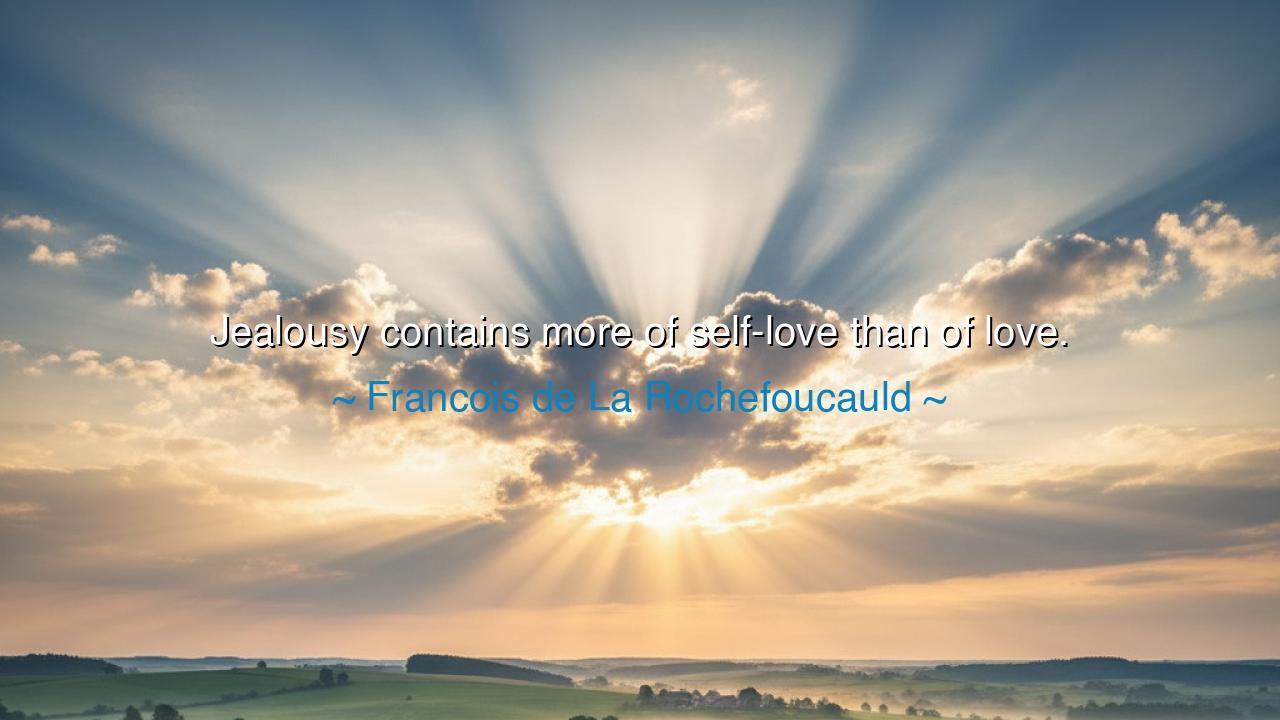
Jealousy contains more of self-love than of love.






“Jealousy contains more of self-love than of love.” So wrote François de La Rochefoucauld, the French moralist and philosopher of the 17th century, whose sharp mind pierced through the illusions of the human heart. His words, simple yet profound, reveal an uncomfortable truth about jealousy — that it is less about devotion to another and more about the wound to our own pride. The jealous person believes their pain springs from love, but beneath that sorrow lies a deeper cause: self-love, wounded and desperate, demanding possession rather than understanding.
In this saying, La Rochefoucauld unmasked the ego, that quiet tyrant ruling the human soul. He lived in the glittering but treacherous courts of France, where envy and pride governed as much as law or reason. There he learned, through keen observation, that when love turns to jealousy, the heart does not grieve for the loss of another’s affection, but for the blow dealt to its own vanity. The jealous lover cries not, “I have lost their heart,” but “How could they choose another over me?” Such emotion is not born of love’s purity, but of injured pride — the fear of being less, of being replaced, of not being enough.
To understand this, we must look not only at the surface of jealousy but at its roots. Love, in its highest form, seeks the happiness of the beloved, even when that happiness lies beyond our reach. But jealousy demands possession — it says, “If I cannot have you, no one shall.” It does not ask, “Are you well?” but “Do you still choose me?” It cloaks itself in tenderness, but beneath that veil burns selfishness. The heart consumed by jealousy does not expand toward another; it contracts inward upon its own wounded reflection. This is what La Rochefoucauld meant — that in jealousy, we love not the other person, but the image of ourselves reflected in their affection.
History gives us many mirrors for this truth. Consider the tragic tale of King Saul and David in the ancient scriptures. Saul once loved David as a son, for David’s music soothed his tormented spirit. But when David’s fame grew — when songs were sung in his honor, and the people hailed him as greater than the king — Saul’s jealousy awoke. He sought to destroy the very man he had once cherished. It was not love that moved him to rage, but self-love, humiliated by the shadow of another’s greatness. Saul’s heart could not bear to see his own light dim beside another’s flame, and thus his jealousy consumed him, leaving love cold and empty.
In this way, jealousy reveals a deeper fragility within us — the need to be special, the hunger to be irreplaceable. We long for others to confirm our worth, to mirror our importance back to us. And when they do not, we suffer. Yet that suffering, as La Rochefoucauld saw, is not the sorrow of love lost, but the cry of wounded self-regard. For true love has no fear of comparison, no need to possess. It trusts. It rejoices in the beloved’s joy. It is generous, not envious. The jealous, however, love themselves more than they love the one they claim to adore — and thus their love becomes a chain, not a gift.
The wise, therefore, must look inward when jealousy stirs. Ask yourself: “Do I hurt because I love them, or because I have been denied something I desire?” In that question lies the beginning of freedom. If it is self-love that bleeds, then humility is the cure. We must learn to love others as they are, not as extensions of ourselves. We must remember that love is not ownership, but offering — not conquest, but communion. The more we cling to control, the more we suffocate what we claim to cherish.
So, my listener, take this teaching to heart: if jealousy arises within you, do not despise it, but use it as a mirror. Let it show you where pride still hides in the corners of your soul. Let it humble you, soften you, remind you that love is not measured by how much we are loved in return, but by how freely we give. For the jealous heart shrinks, while the loving heart expands. Choose expansion. Choose generosity.
And remember the wisdom of François de La Rochefoucauld: when jealousy comes, it is the voice of self-love crying out in fear. But love, true love, is fearless. It does not compete, it does not grasp — it simply gives, and in giving, it grows. So release your grip, open your hands, and let love breathe. Only then will you know not the pain of jealousy, but the peace of a heart that is truly free.






AAdministratorAdministrator
Welcome, honored guests. Please leave a comment, we will respond soon